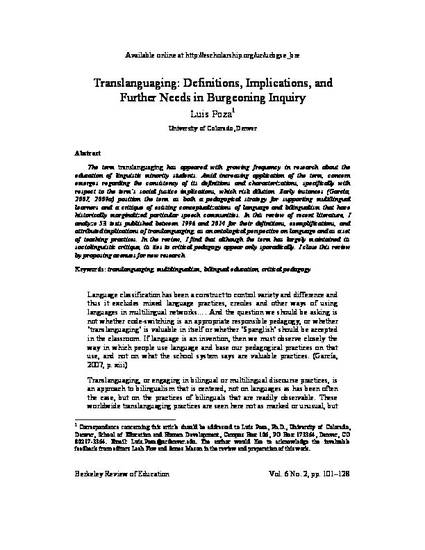
Article
Translanguaging: Definitions, Implications, and Further Needs in Burgeoning Inquiry
Berkeley Review of Education
(2017)
Abstract
The term translanguaging has appeared with growing frequency in research about the education of linguistic minority students. Amid increasing application of the term, concern emerges regarding the consistency of its definitions and characterizations, specifically with respect to the term’s social justice implications, which risk dilution. Early instances (García, 2007, 2009a) position the term as both a pedagogical strategy for supporting multilingual learners and a critique of existing conceptualizations of language and bilingualism that have historically marginalized particular speech communities. In this review of recent literature, I analyze 53 texts published between 1996 and 2014 for their definitions, exemplifications, and attributed implications of translanguaging, as an ontological perspective on language and as a set of teaching practices. In the review, I find that although the term has largely maintained its sociolinguistic critique, its ties to critical pedagogy appear only sporadically. I close this review by proposing avenues for new research.
Keywords
- translanguaging,
- multilingualism,
- bilingual education,
- critical pedagogy
Publication Date
2017
DOI
10.5070/B86110060
Publisher Statement
This article was published in the Berkeley Review of Education, volume 6, issue 2, 2017. It is also available online at this link.
Citation Information
Luis E. Poza. "Translanguaging: Definitions, Implications, and Further Needs in Burgeoning Inquiry" Berkeley Review of Education Vol. 6 Iss. 2 (2017) p. 101 - 128 ISSN: 1947-5578 Available at: http://works.bepress.com/luis_poza/8/
